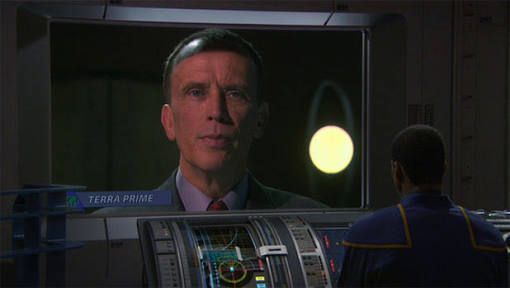-
Welcome! The TrekBBS is the number one place to chat about Star Trek with like-minded fans.
If you are not already a member then please register an account and join in the discussion!
You are using an out of date browser. It may not display this or other websites correctly.
You should upgrade or use an alternative browser.
You should upgrade or use an alternative browser.
Abrams On Star Trek Into Darkness Flaws
- Thread starter TrekToday
- Start date
I'm inclined to agree. Personally, I enjoy Marcus' near psychotic paranoia, and his willingness to go to war over slight provocations.What many people seem to miss is that it doesn't matter if Marcus is right or even of the Klingons are a threat. This is a post-9/11 Starfleet where people have freaked out, overreacted, and see WMDs where there aren't any. The whole point of the movie is how people react to a tragedy, and frequently dive unintentionally and headlong "into darkness" themselves in their desire to assure such a thing never happens again.
The script has many many flaws, but this isn't one of them.
It's a more interesting take on the consequences of Nero's attack than treating it with a shrug.
I'm inclined to agree. Personally, I enjoy Marcus' near psychotic paranoia, and his willingness to go to war over slight provocations.
Weller makes a great larger-than-life villain. Really, he's this movie's Khan.


What many people seem to miss is that it doesn't matter if Marcus is right or even of the Klingons are a threat. This is a post-9/11 Starfleet where people have freaked out, overreacted, and see WMDs where there aren't any. The whole point of the movie is how people react to a tragedy, and frequently dive unintentionally and headlong "into darkness" themselves in their desire to assure such a thing never happens again.
The script has many many flaws, but this isn't one of them.
Exactly.
The Abrams films have been accused of not doing what Trek does — comment on our society. But ItD did, and in the way you stated above. Frankly, it did it as well or about on par with many of TOS (looking at you "A Private Little War" and "A Taste of Armageddon.")
While we can quibble about the execution, ItD was about something —*despite what the critics say.
The problem with Into Darkness was that it had too many ties to previous Trek? And they've now learned from those mistakes when making the new Star Wars movies even though those films have 3 characters who were in the movies over 30 years ago, have something that looks like a death star and a baddie that looks like Darth Vader. Hmmmm......
Given that Ep. 7 is a direct continuation of six previously established films with their own history, and Into Darkness was a sequel that was trying to make its own history, I don't think that is as contradictory as it might seem on the face of it.The problem with Into Darkness was that it had too many ties to previous Trek? And they've now learned from those mistakes when making the new Star Wars movies even though those films have 3 characters who were in the movies over 30 years ago, have something that looks like a death star and a baddie that looks like Darth Vader. Hmmmm......
It almost commented on society, but never followed through with any thoughts of its own. It includes loads of modern topics and goes no where with them. Kirk decides breaking borders, and sending drones weapons, and following illegal orders is bad, but so what, why did he decide it? Was it purely pear pressure from his friends, nothing more? As far as we know that really is all there was to it for him.What many people seem to miss is that it doesn't matter if Marcus is right or even of the Klingons are a threat. This is a post-9/11 Starfleet where people have freaked out, overreacted, and see WMDs where there aren't any. The whole point of the movie is how people react to a tragedy, and frequently dive unintentionally and headlong "into darkness" themselves in their desire to assure such a thing never happens again.
The script has many many flaws, but this isn't one of them.
Exactly.
The Abrams films have been accused of not doing what Trek does — comment on our society. But ItD did, and in the way you stated above. Frankly, it did it as well or about on par with many of TOS (looking at you "A Private Little War" and "A Taste of Armageddon.")
While we can quibble about the execution, ItD was about something —*despite what the critics say.
I actually like that it is left opened end, though his speech at the end of the film alludes to the influence of Pike in making his decision, recognizing that his actions were neither legal nor moral.
It could have been more on the nose, but I actually prefer the more subtle approach. It allows viewers to draw their own conclusions, if they draw any at all.
It could have been more on the nose, but I actually prefer the more subtle approach. It allows viewers to draw their own conclusions, if they draw any at all.
^^ He learns about his responsibilities, to the rule of law and to his crew.
One person's opinion.
Also, my opinion, but still...
Similar threads
- Replies
- 85
- Views
- 5K
- Poll
Contest: VOTE
Favorite Star Trek Anniversary Logo (w/ pics + poll)
- Replies
- 28
- Views
- 2K
- Replies
- 95
- Views
- 9K
- Replies
- 32
- Views
- 2K
If you are not already a member then please register an account and join in the discussion!

